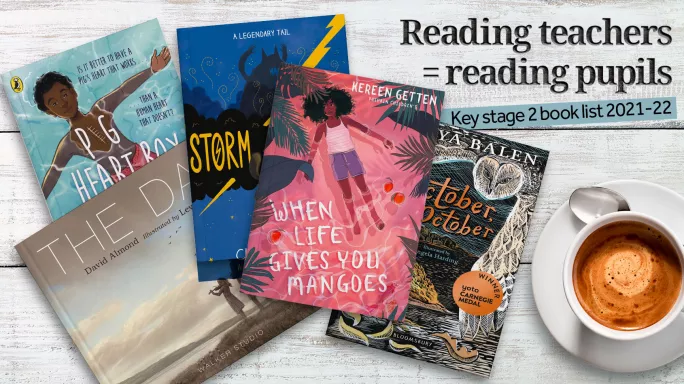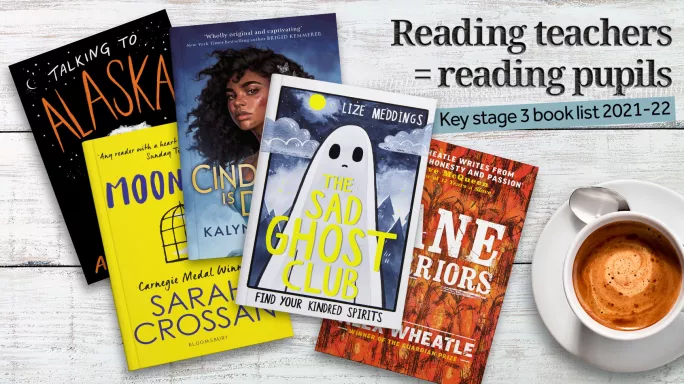- Home
- Teaching & Learning
- General
- Welcome to the children’s book club... for teachers
Welcome to the children’s book club... for teachers

It’s 4.30pm on a Tuesday and a group of adults are having an animated discussion in the corner of a coffee shop. They’ve all got a copy of the same book, and to a passer-by, it would look like any other book club.
However, on closer inspection, the book seems a little below their reading age: Pig Heart Boy by Malorie Blackman.
This is Reading Teachers = Reading Pupils (RTRP), a book club with a twist.
Created in 2016 by Ali Mawle, co-chief executive of Cheltenham Festivals, RTRP is an initiative developed to help teachers find new, relevant and worthwhile books to read with their class.
While the national curriculum says that teachers need to teach a “wide range of fiction, poetry, plays, non-fiction and reference books or textbooks” at key stage 2, and cover a wide range “of genres, historical periods, forms and authors” at KS3, teachers are left to their own devices when choosing specific books - something that some would welcome support with.
“As a former primary school teacher, Ali was aware that teachers didn’t have much time to be looking for contemporary books and great book recommendations,” says Rebecca Smith, the learning and participation manager at Cheltenham Festivals.
At the same time, she says, Mawle also knew that there was “lots of research around reading for pleasure being a really important tool in raising children up out of difficult situations and boosting social mobility”. This prompted her to set up a book club trial in Gloucestershire.
In the years since, RTRP has grown beyond the county, and there are now 50 groups across the UK.
A reading club for teachers: how does it work?
So how exactly does the programme work? And what are the benefits for teachers and their pupils?
At the moment, the clubs serve KS2 and KS3 teachers - but there are plans to expand out to KS1.
Each year an expert panel of people working in the children’s literature sector and teachers and leaders sends a long list of books to Cheltenham Festivals, which then makes a shortlist, considering genre, author and character diversity. Together, the panel then selects five books per key stage for the teachers to read and discuss at the book clubs.

Every October there is a launch event to reveal the first book - and throughout the year teachers learn what they will read next at their club meetings.
Meeting times and places depend on each book club, but often the meetings happen in libraries and coffee shops, and last for around an hour and a half on weekday afternoons from 4pm. It’s up to the teachers when they read the books - but most do so in their spare time.
For Jane Avery, a teacher at St James’ C of E Primary, in Cheltenham, it’s worth the personal investment of time.
“There’s so much stuff that you have to do as a classroom teacher, and the book group protects that 90 minutes of CPD around literacy,” she says. “You get to talk about books with people who also love books, who have great ideas about how to teach them in the classroom. It’s just that it’s CPD like nothing else: you’re not being lectured by anybody; it’s shared understanding and interest.”
During the meetings, teachers are encouraged to use Aidan Chambers’ approach to book talk, and share how they would use the books in the classroom.
Sarah Cooksley, head of learning and participation at Cheltenham Festivals, explains that organisers wanted teachers to use a technique that was easily replicable with pupils.
“The idea [behind Chambers’ method] is that it’s non-hierarchical book talk, using a ‘tell me’ approach. At first, it focuses on likes and dislikes, and then readers cautiously explore meaning in a more deliberate way through puzzles and patterns,” she explains. “There are core prompts: ‘tell me what you liked, what you didn’t like’, but then that’s broken down into structural questions regarding things like characters, themes, connections and hooks.”

More on teaching and learning:
- How to include more people of colour in your curriculum
- Do vocabulary games boost literacy?
- How a baseline reading test could transform whole-school literacy
The benefits of book clubs
So, what do teachers make of the clubs?
Cheltenham Festivals surveyed the teachers involved in the RTRP this year, and found that after taking part, 86 per cent said they were more enthusiastic about reading children’s literature and 80 per cent said they had more confidence choosing books to read with their class (see box below).
Since joining the club, Avery has set up her own book club with Year 6 pupils using the same books, mirroring Chambers’ technique.
“Whatever we do in the book group as adults is very transferable,” she says. “Initially, you have to prompt the children a lot more. But actually, they really get into the swing of it and the book talk then becomes very natural amongst them as they explore and find meaning with each other, and with you as an adult.”
Teachers at her school now often integrate the books from the year before into their curriculum. Cheltenham Festivals, she says, keep a class set that a teacher can borrow for a half-term.
At the end of each year, the clubs come together for a regional sharing session, in which they discuss best practice and favourite books - and, sometimes, meet the authors.
As a result, teachers are inspired by others’ ideas: when Cooksley was a teacher, for example, she heard about a parent book club that another RTRP teacher had set up, and set up one in her own school. Others have gone on to display the cover of the book they’re currently reading on the classroom door, to inspire pupils to have conversations with them about it.
The influence of RTRP, Cooksley says, increases the longer the teachers are involved in the club.
“When a teacher first joins, they might take a book into the classroom over the course of a year or do a book for a small group of children but by year two and three, you see it really embedded into the culture, their classroom and their school. It starts to have an impact on curriculum design and impact on the design of a school day, in which there are sessions for guided reading and group reading,” she says.
Of course, teachers don’t necessarily need to sign up to the Cheltenham Festivals book club to see these benefits: this model could be replicated, with adjustments, in your own school or MAT, to suit your own context.
So, as you look ahead to the new academic year, perhaps it’s time to expand your reading list beyond the usual grown-up holiday reads and into the world of children’s literature.
You can find out about your local RTRP book club here.
You need a Tes subscription to read this article
Subscribe now to read this article and get other subscriber-only content:
- Unlimited access to all Tes magazine content
- Exclusive subscriber-only stories
- Award-winning email newsletters
Already a subscriber? Log in
You need a subscription to read this article
Subscribe now to read this article and get other subscriber-only content, including:
- Unlimited access to all Tes magazine content
- Exclusive subscriber-only stories
- Award-winning email newsletters
topics in this article



